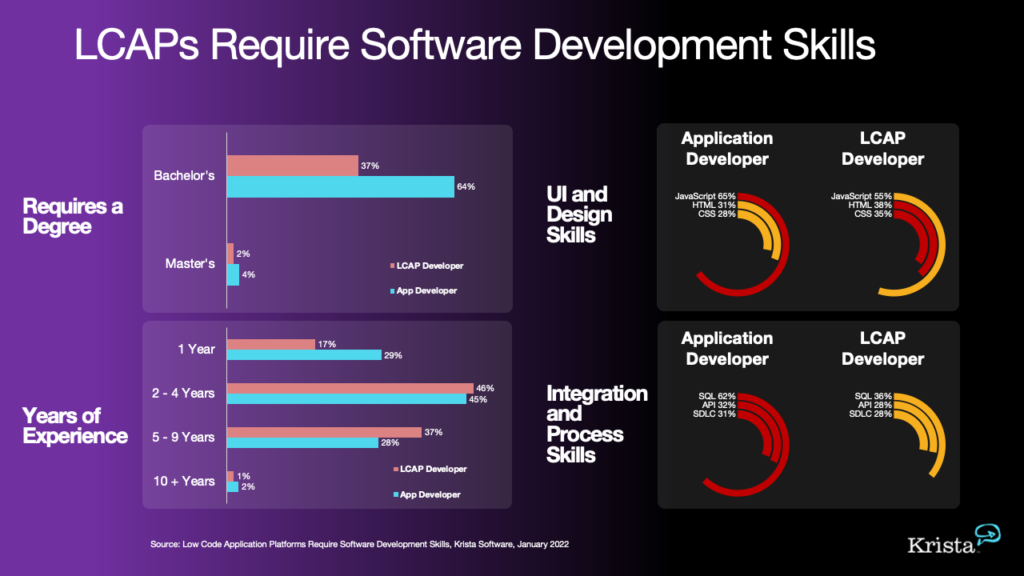Low-code development of applications significantly increases accessibility for non-developers. Often, they are called "citizen developers," because of a variety of key aspects: Intuitive visual interfaces:
Drag-and-drop Builders: Lowcode platforms provide drag-and-drop interfaces, which enable non-developers to create visually appealing applications, without needing codes. The development process is now easier for those who have no technical background.
WYSIWYG Editors: "What You See Is What You Get" editors allow users to build interfaces and workflows an approach that is similar to the final product, making it much easier to use and understand.
Simplified Workflow and Logic Design:
Visual Workflow Modeling - Users are able to develop business procedures and logic for applications using visual flowcharts or models. This is a lot more efficient than traditional programming techniques.
Low-code platforms usually come with pre-built logic elements (e.g. the conditional loops, statements) that eliminate the need for complicated programming.
Templates and components that can be reused:
Library of pre-built templates: A lot of Low-Code platforms provide templates that are based off of typical application types. Developers who are not developers will be capable of modifying the templates as needed.
Reusable widgets and Modules Utilizing reusable widgets or modules users can speed up the process of creating them by cutting down on the need for detailed technical know-how.
Guided Development and Tutorials:
Step-by-step guide: Platforms offer tutorials, tips on screen, and guided development paths to help non-developers build applications.
Interactive Tutorials. Interactive, hands on tutorials allow users to gain knowledge by doing.
Integration with existing tools
Seamless Integration: Low-code platforms have been built to easily integrate with existing business tools and systems (e.g. CRM, ERP and ERP) and allow non-programmers to develop applications that function with their existing workflows.
APIs and Connectors: Built-in APIs and connectors simplify the integration process by allowing non-developers to connect their applications with external services, without requiring complicated coding.
Collaboration Features:
Team Collaboration - Features such as real-time team collaboration, and shared workspaces allow non-developers to work effectively alongside analysts, professionals, developers, and others.
Access Control Based on Roles: Non-developers can have access to roles and levels of access that allow their participation without compromising security or functionality.
Automated Tests and Debugging
Test tools are included: Many low-code platforms come with integrated debugging and testing tools. These tools streamline the process, making it easy for non-developers to ensure their applications are operating properly.
Platform detects problems when they happen and provides solutions. This aids non-developers with troubleshooting.
Low-code development is more accessible to non-developers as it democratizes the development process. Low-code platforms provide intuitive visual tools, guiding experiences, and let business users actively take part in the creation apps, maintaining them and updating them. Check out the top look what I found for website examples including cross platform mobile dev, develop web application, cross platform mobile dev, cross platform mobile app development, application modernization, rapid application design, rapid application design, azure sql databases, cross platform mobile development, rad application development and more.

Benefits Of Developing Applications Using Low-Code In Terms Of Scalability And Flexibility
Low-code applications have a number of advantages in terms of scaling. They are flexible and can be modified to meet new demands. Here are the major benefits:
Cloud-based deployment: A lot of low-code platforms are cloud dependent. This lets applications expand seamlessly with cloud infrastructure. This allows companies to handle more workloads without having to be concerned about managing servers.
Auto-Scaling feature: Built-in features that automatically scale resources to meet demand can ensure consistent performance with no manual inputs during peak hours.
Flexible Architecture:
Low-code platforms encourage modular designs where components can independently be developed, assessed and adapted. Modularity increases flexibility and enables easier updates or expansions of specific components without affecting the entire system.
Microservices Architecture: Microservices architecture supports the creation of applications as an loosely coupled collection of services. This allows for greater capacity and flexibility.
Customizable Solution:
Extensibility: Low-code platforms typically permit custom programming and scripting, which allows developers to expand the capabilities of the applications beyond what is available out-of-the-box. Developers can meet their own business needs without any restrictions.
Third-Party Integrations: The capacity to integrate with third-party services and APIs permits companies to add additional functions and services as needed to enhance the functionality of the application.
Agile Development and deployment:
Continuous Delivery and Deployment Low-code platforms support agile methods enabling continuous integration, continuous delivery (CI/CD). This lets applications be updated and upgraded rapidly as a result of feedback from users.
Iterative Design: Since low-code is an iterative procedure the applications can be incrementally enhanced and scaled up. This allows for controlled growth and reduces the risks of massive changes.
Resource Optimization
Effective resource management Low-code platforms optimize resources by offering tools for monitoring and controlling the performance of the application. This ensures that resources are efficiently used and can be scaled up or down based on the actual requirements.
Load Balancing: The integrated load balancing function distributes workloads equally across servers. This improves the system's ability to handle large volumes of traffic and also ensures the same performance.
Global Reach
Multi-Region deployment: Low-code applications can often support deployment across multiple regions. This allows businesses to offer low-latency service to users across the globe. This is particularly important when applications are popular with a worldwide user base.
Localization Support : Built-in language support enables applications to be modified to accommodate different local languages and requirements. This increases their flexibility in a variety of markets.
Updates and maintenance
Maintenance is made easier: The modularity and visual appeal of low-code applications makes maintenance easier which allows quick update and bug fixes to be implemented without lengthy downtime.
Version Control Version Control: Integrated version control systems assist in managing rollbacks and changes making sure that updates are deployed without risk and that previous versions are restored when required.
Cost Efficiency:
Low-code platforms reduce development costs by reducing the need for extensive code. They also make it possible to scale applications without need for a significant increase in effort or expense.
Pay-As-You-Go Models: Many low-code platforms provide flexible pricing models, such as pay-as-you go, which aligns costs to actual usage and growth, allowing financial flexibility.
The majority of low-code app developers offer a high level of scalability and flexibility that allows businesses to quickly build scalable and flexible applications. These platforms allow quick adjustments to the changing requirements and efficient use of resources and constant improvement. This guarantees that the application are able to grow along with the company. Take a look at the best more tips here for Legacy application modernization with Low-code for website advice including application modernization software, rad application development, low code development platforms, stored sql procedures, azure sql server, cross platform app dev, push notifications, rad development, app modernization, rad development and more.

Benefits Of Low-Code App Development With Respect To Limitations And Customization
Low-code app development is a balancing solution that has significant advantages in terms of overcoming limitations while also permitting customization. Here are the benefits:
In overcoming Complexity Barriers:
Low-code development platforms are easier to use due to the fact that they come with pre-built components, templates, and various other tools. They also permit faster deployment of complicated applications.
Guided Workflows Many platforms have wizards and workflows to guide developers through the complex process. This can help reduce the possibility of error, while ensuring consistency.
Scalability Solutions
Built-In Scalability: Low-code platforms usually have features that support scalable architecture, allowing applications to handle increased loads without significant redevelopment.
Performance Monitoring: Integrating instruments for monitoring performance optimization, tuning and monitoring assist applications to scale effectively.
Security and Compliance
Integrated Security Features : Low code platforms come with security features built-in, such as encryption and access control based on role. They also perform automated checks for compliance to address security concerns.
Regular Updates: Platforms frequently update their security protocols and conformity measures, making sure that applications are protected against new threats.
Customization:
Extensibility:
Custom Code Integration : Low-code platform often allows the integration of customized codes (e.g. JavaScript, Python) that allows developers to extend the functionalities beyond what is available in the standard features.
Custom Modules and Plugins: Developers have the option of creating custom modules or plugins in order to modify specific functionality to meet the specific requirements of a particular business.
APIs Integration
API Support: The extensive API support allows seamless integration of other systems and services. This enables extensive customization and connectivity.
Third-Party services: Low code platforms offer connectors that are designed to work with popular third-party services. This makes it simpler to customize and integrate applications.
Flexible UI/UX Design
Customizable Interfaces: Developers have the ability to design and modify user interfaces according to specific branding and usability criteria which results in a custom user experience.
Responsive Designs: The software can be adapted to fit different screen sizes and devices.
Business Logic Customization
Visual Workflow Builders: Visual tools used to design and customize workflows, business logic and processes enable developers to develop complicated and customized processes without lengthy programming.
Conditional Logic and Scripting : Platforms support conditional logic, as well as custom scripting to meet specific business rules.
Data Management
Custom Data Modeling: Designers develop custom models to meet particular requirements of the application. They can customize data handling to the business's specifications.
Advanced Data Processing: Integration of advanced tools and capabilities for data processing permits customization of how data is analyzed and used in the application.
Balanced Limitations and Customization
Frameworks and Standards
Low-code platforms support the use of industry-standards and best practices, resulting in applications of high-quality that are robust and safe.
Governance Frameworks - Built-in governance systems make sure that any modifications do not affect security, integrity, or adherence.
Iterative Development and Feedback
Rapid Prototyping. The ability to speedily prototyping and testing modifications allows developers to iterate the application based on the feedback of users. This allows them to improve the app in order to better meet the requirements of users.
Continuous Improvement: Low-code systems support constant improvement, allowing constant customization and enhancements as business requirements evolve.
Users Empowerment
Low-code platforms enable citizen developers through letting non-developers through intuitive interfaces to customize applications, they expand the pool contributors that can modify and enhance applications.
Training and Support: A lot of platforms offer a wealth of training and support to assist users with making efficient customizations without compromising stability or performance.
Overall, low-code application development offers a robust system for dealing with limitations, while providing ample opportunities for customization. This allows businesses to create and maintain apps that are customized and functional to meet their specific needs, while ensuring the highest standards of safety, quality and scaling.
